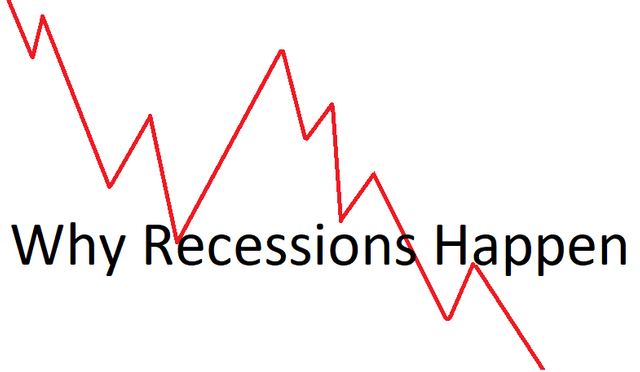Why Recessions Happen
The life blood of an economy is its money supply. And, the money supply is literally determined by how freely banks make loans. Loan applications are determined based on present and projected conditions. That is, the bank looks at a person's employment and income history, assets, and outstanding loans and liabilities and calculates how likely that person is to default on a loan of a given amount. If the person is of a group who it believes will pay more in interest than they will default on, the bank approves the loan.
However, when the bank predicts how much disposable income each person is likely to have, it has to make assumptions about future economic conditions. If a bank is too optimistic, it will give out many loans people cannot repay. When they inevitably default on their loans, the bank can often lose money in total. If a lot of people default simultaneously for high enough amounts, it has the potential to send a bank itself into default.
This is what happened in 2008, for example. Banks had made ridiculously optimistic loans, through crazy mortgages and refinances, as well as credit cards, and when it came time to collect, nobody had the funds to repay them, or even assets worth enough to repossess to recoup the loss. This absence of expected revenue quickly toppled aggressive banks who had played fast and loose with everyone's savings, and as they went under, other banks whom they owed money to found themselves being pulled toward the abyss in the wake of their sinking peers.
To protect themselves (and their customers) in these turbulent conditions, every bank still standing tightens up their loan processes, carefully screening out all but the very least risky applicants, and charging even them a high interest rate. As credit dries up, two things happen simultaneously:
- Business expansion becomes very expensive and unprofitable, due to high interest rates. New job openings become rare. Additionally, businesses that had been running on credit suddenly can’t run anymore. They close down, and their employees are all fired.
- At the same time, individual people are denied cheap credit, as well. Home loans, car loans, and even credit cards all raise their rates, squeezing people’s purchasing power right when they are losing employment opportunities.
1 again) As people lose their jobs and credit, they are unable to afford purchases. As a result, businesses receive less revenue. Those on the edge fail, and their employees are laid off.
2 again) More people lose their jobs and credit. Their consumption falls. Rinse and repeat.
This process continues until every bad credit risk has been purged from the books, the creditors of those debts have taken huge losses, labor becomes cheap, rent drops low, and competition is scarce. These four factors will make investment supremely profitable, and are likely to reverse the recessionary trend. The same forces that unwound the economy begin, in reverse, to wind it up again.
The United States is once again facing a major credit crisis. This time, instead of unreasonably optimistic mortgage payments, banks have been counting on unreasonably optimistic college loan payments. As it becomes increasingly clear that the latest batch of college goers accumulated historically high debt and historically low wages, the expectation that they will be able to pay back their loans while simultaneously contributing historically comparable levels of consumption to the economy is absurd.
Students are not going to pay back their loans, and even if they do, it will be at the expense of the other industries that are relying on spending to follow demographic trends of the past. The reckoning for inefficient college training is at hand, and because of the way debt is leveraged into more debt, the whole world economy may stagnate as this charade comes cascading down.
Likely, the end result is going to be massive inflation by the Federal Reserve to stimulate economic “growth,” and, “coincidentally,” reduce the effective value of all debts owed. And, of course, what does inflation in the U.S. mean for Steemit? Well… perhaps I won’t suffer as much as my compatriots.

@waygreenergrass You have received a 100% upvote from @steemprotector because this post did not use any bidbots and you have not used bidbots in the last 30 days!
Upvoting this comment will help keep this service running.
wow,,,you are back...i’m so happy..